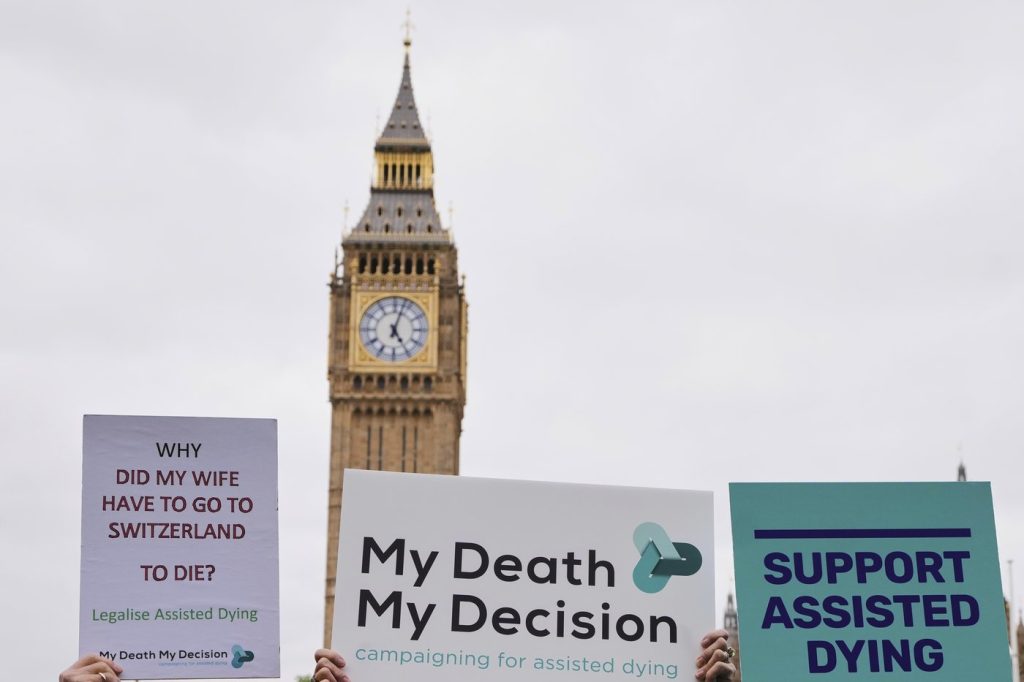LONDON (AP) – On Friday, U.K. lawmakers took a significant step towards changing social policy in the country by approving the Terminally Ill Adults (End of Life) Bill. This legislation aims to allow terminally ill adults in England and Wales the option to choose to end their lives, a move described by many as potentially the most substantial policy shift since the partial legalization of abortion in 1967.
Members of Parliament voted 314-291 in favor of the bill, following a passionate debate. The majority of 23 votes was notably smaller than the previous majority of 55 votes in November, signifying that some lawmakers had reconsidered their positions in the interim months. Since the last deliberation, the bill has undergone scrutiny and various amendments, reflecting ongoing discussions around this contentious issue.
Labour lawmaker Kim Leadbeater, who proposed the bill, expressed her relief after the vote, stating, "I appreciate it's a huge moment for the country. It was a huge sense of relief because this is the right thing to do." The proposed legislation is now set to be reviewed by the unelected House of Lords, which has the power to amend or delay the bill but cannot ultimately overrule the House of Commons.
The bill stipulates that adults over the age of 18 in England and Wales who are terminally ill and given less than six months to live will have the option to apply for assisted dying. Notably, this bill does not extend to Northern Ireland or Scotland, which are handling their own discussions regarding similar legislation. One significant alteration from previous drafts was the removal of the requirement for judicial approval; rather, applications will now be evaluated by two doctors alongside a panel comprising a social worker, a senior legal figure, and a psychiatrist.
Further amendments to the bill aim to establish independent advocacy for individuals with learning disabilities, autism, or mental health issues, as well as to create a disability advisory board. If approved, the person seeking assisted dying must be capable of self-administering any lethal medication. Importantly, the revised bill ensures that no individuals, including healthcare providers and social workers, will be mandated to assist with the process.
The discussion surrounding the bill has sparked significant division among lawmakers. MPs were permitted to vote according to their personal beliefs rather than party directives, fostering unexpected alliances across the political spectrum. Supporters argue that individuals with terminal illnesses deserve the right to choose how they wish to end their lives to alleviate suffering, particularly as the current healthcare landscape may unfairly disadvantage those unable to afford travel to countries where assisted dying is legal. Conversely, opponents, including many representing vulnerable communities, fear that the legislation could lead to coercion and pressure on individuals with disabilities or senior citizens to end their lives to lessen financial or familial burdens.
Emotions ran high outside Parliament, where hundreds gathered to voice their opinions on the bill. Supporters donned apparel marked with the phrase "Campaign for Dignity in Dying," while opponents held banners warning against turning the National Health Service into a "National Suicide Service." The vote was met with jubilation from proponents, including Sarah Wootton, chief executive of Dignity in Dying, who stated, "This vote sends a clear message. Parliament stands with the public and change is coming."
The legislation now awaits deliberation in the House of Lords, where any amendments will need to be sent back to the House of Commons for further examination. There is also a suggestion that legal challenges may emerge against the bill, with organizations such as "Right To Life U.K." and "Care Not Killing" pledging to continue their opposition to the proposed changes. Backers of the bill estimate that it will take four years for implementation, potentially placing its enactment around 2029, concurrent with the next general election.
While Prime Minister Keir Starmer has voiced support for the legislation, the government's stance remains divided, with Health Secretary Wes Streeting opposing it. Officials have maintained that they will respect the parliamentary outcome, though there are still uncertainties about the bill's financial implications and its impact on the National Health Service, hospice care, and existing legal frameworks.
The discussion around assisted dying is not isolated to the U.K., as countries like Australia, Belgium, Canada, and specific U.S. jurisdictions have already legalized forms of assistance in dying, each with their own eligibility criteria. It is crucial to note that assisted suicide differs from euthanasia, which involves healthcare practitioners administering a lethal injection under specific circumstances, allowed in nations like the Netherlands and Canada.












